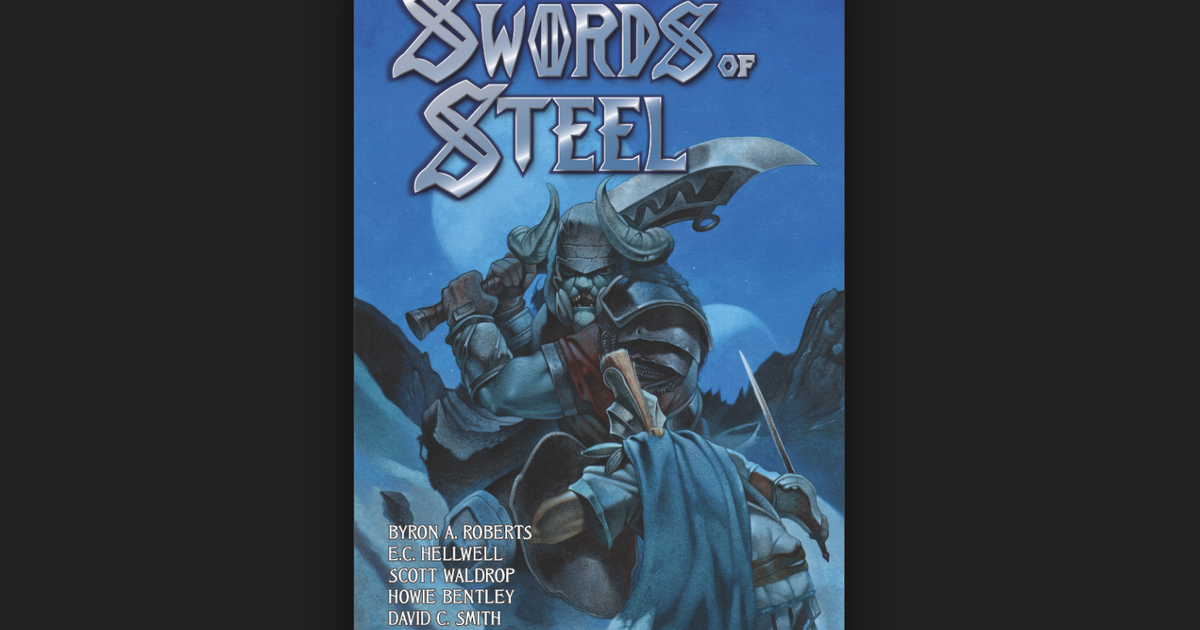Swords of Steel, edited by D.M. Ritzlin, is an anthology of fantasy and horror stories that's unlike anything else on the market, because all of the authors are from heavy metal bands. Authors include such talented musicians/lyricists as E.C. Hellwell of Manilla Road, Byron Roberts, (Bal-Sagoth), Mike Scalzi (Slough Feg), and many others. Since these creative individuals have been playing metal for so long, you know they have a different perspective than the usual fantasy authors do. Two volumes of Swords of Steel have been published so far. There's a third one coming.
Ritzlin was listening to the song Dark Avevenger by Manowar, and its lyrics reminded him of sword-and-sorcery stories that appeared in the '70s anthology series Swords Against Darkness, so he began to wonder if they had ever written fiction, or if any other bands had. Then he remembered reading interviews with Manilla Road and Bal-Sagoth where they said that they'd written stories but never bothered trying to get them published. So the idea of publishing it ignited, and Swords of Steel was forged.
Interview with D.M. Ritzlin
What kind of horrors lurk in these stories? Will readers find strange monsters rarely found in your typical horror story?
Certainly. Various ghosts, ghouls and other terrible creatures haunt Jaron Evil’s Darke Manor and Scott Waldrop’s stories. But I don’t want to give too much away.
Do any of these stories connect to each other or share a world? Or are they extensions of larger works?
None of the authors collaborated with each other to create a shared world, but some of them have reoccurring characters or settings they use in their own stories. For example, the demon-god Thorn appears in both of Howie Bentley’s stories for Swords of Steel as well as tales that have been published in other anthologies.
Could you describe some of the magic featured in 'Sword and Steel'?
In Journey in Somnamblia by Jean-Pierre Abboud, a group of four rogue wizards collaborate to cast a spell of concealment. The spell requires not just rare items of a magickal nature, but the simultaneous concentration of all four casters. Magic in Howie Bentley’s stories is (as one would expect from him) far more visceral, requiring human sacrifice. But in most of the stories, the protagonists aren’t the ones making the magic, so it remains quite mysterious.
From "Eve's Grave" by Scott Waldrop, who illustrated his own story
In 'Sword of Steel', are there stories based on real-life experience?
Mike Scalzi is a philosophy teacher, so I suspect that he drew from that for his story. Particularly the part about the students dozing off or staring at their phones instead of paying attention!
How do you think metal music influenced the style of the writers' fiction?
Heavy metal is a very powerful and uncompromising form of music. Those who are drawn to it aren’t satisfied with the banalities of modern life. The authors express the same values in their stories as they do in their music.
Does music itself play a significant part in the stories?
No, actually, it does not. Eve’s Grave by Scott Waldrop does feature a lengthy lyrical passage, however.
Captain Blackthorne from Byron Roberts' A Voyage on Benighted Seas. Illustrated by Martin Hanford, who also did the covers.
What themes do the fantasy and horror stories in 'Sword of Steel' share?
The fantasy and the horror stories both share a sense of wonder and danger. In the fantasy tales the danger is more direct and physical. There’s an essay in Volume II by David C. Smith, and he says that the element sword-and-sorcery shares with horror is the struggle for survival.
How are some of these stories like 'That Than Which There Can Be No More Horrible' considered "philosophical"?
Mike Scalzi’s story is about a philosophy professor named Dr. Dendrite. He lectures his class on St. Anselm’s ontological argument which proves that God exists. When a student provides a counter-argument he hadn’t considered, it drives him mad. It’s kind of a philosophy paper written in prose form, with a Lovecraft influence.
Tell us about an interesting character or group of characters in your novel.
Captain Caleb Blackthorne is the protagonist of Byron Roberts' stories Into the Dawn of Storms and A Voyage on Benighted Seas. He's an Englishman in the service of Queen Elizabeth the First. Blackthorne's dreams are haunted by visions of his past lives in unfathomably ancient worlds, always ending in his death. With the aid of his crew (including a Norseman, a Celt, a Nubian, and a ninja!) he explores a mystical island in search of a relic that will put an end to the malicious visions.
Do any of your stories tackle political or religious themes? Or do they function more as an escape from reality?
No, those topics don’t get touched on. I wouldn’t say it’s completely an escape from reality, though. Some of the stories have a message, just not a political one. But the primary objective is entertainment. If you’re looking for pseudo-intellectual ramblings on normative gender identities (or whatever) thinly disguised as fantasy fiction, stay away from Swords of Steel.
For more information on Swords of Steel, check out dmrbooks.storenvy.com
Explore new topics and discover content that's right for you!







